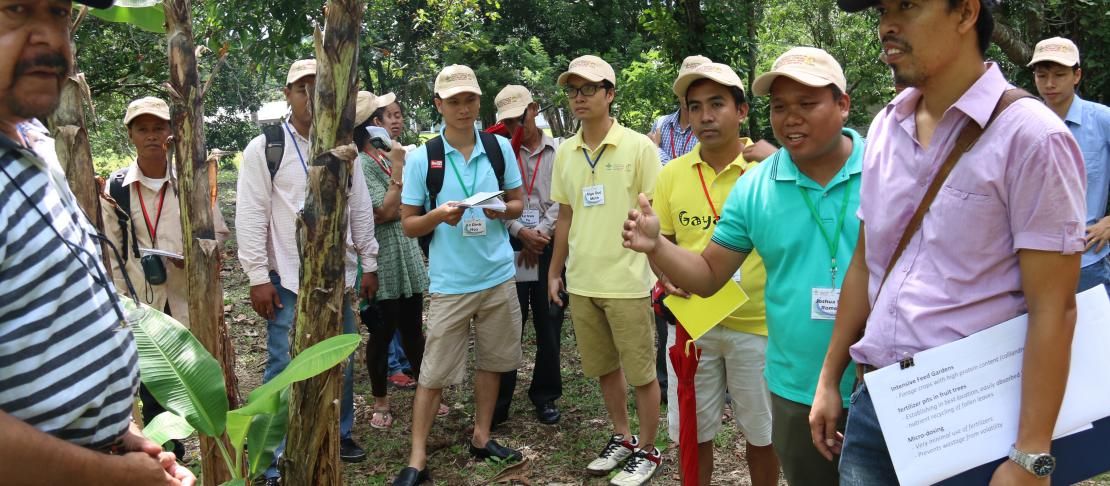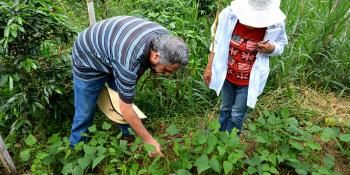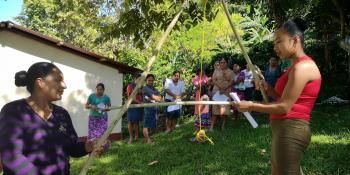Southeast Asian farmer leaders learn about climate-smart agriculture in Vietnam

Southeast Asian farmer leaders will visit two Climate-Smart Villages in Vietnam to learn about climate-smart practices and technologies applied on the ground.
For communities to effectively address climate-related issues and changes such as increasing temperature, unpredictable rainfall and rising sea levels, they should be able to apply their knowledge in their own situations and adapt appropriate climate-smart practices. To build such capacity in CSVs, it is important to expose the communities, especially their leaders to different climate-smart agriculture (CSA) options that will help them decide the best options for their situation.
The CGIAR Research Program on Climate Change, Agriculture and Food Security in Southeast Asia (CCAFS SEA) is organizing a roving workshop for Southeast Asian farmers to learn about the CSA practices being done in two Climate-Smart Villages (CSVs) in Vietnam.
Nineteen village leaders and farmers (including nine women leaders) from Rohal Suong CSV in Cambodia, Ekxang and Phailom CSVs in Lao PDR and Ma, My Loi and Tra Hat CSVs Vietnam will be joining the roving workshop to the Ma and My Loi CSVs from 22 to 28 May 2016. They will be accompanied by four translators (Khmer – Vietnamese and Lao – Vietnamese) and six staff of the International Rice Research Institute (IRRI), International Center for Tropical Agriculture (CIAT) and World Agroforestry Centre (ICRAF) based in Vietnam. Laotian and Cambodian students from the Vietnam National University of Agriculture (VNUA) will serve as translators for the non-Vietnamese participants.
This year’s roving workshop will showcase the two CSVs and CSA techniques and technologies practiced in these villages. Field lessons in the Ma CSV include CSA practices such as bio-intensive gardening, fruit tree production systems, feeding gardens and livestock production, grass strip-cassava and agroforestry systems and fish-cage culture. The participants will also get to see school and home gardens, vermiculture demonstrations and a gasifier kiln and groundnut trial in My Loi. Integrated systems, rice fields and brackish aquaculture would also be observed during the workshop. The participants will have short synthesis and reflection sessions after each site visit.
To further enrich their learning, there will also be socio-cultural interaction with village people in the My Loi CSV.
This roving workshop will be the second of its kind that CCAFS SEA has organized.
“We are doing it again because we find the roving works as a very effective way of knowledge sharing and technology transfer among farmers and CSV leaders from different countries. We have seen farmers adapt and put to use immediately the know-how and technologies they pick up in previous roving workshop,” says Dr Leocadio Sebastian, CCAFS SEA program leader.
From 8 to 17 September 2015, participants from the six CSVs in Vietnam, Laos and Cambodia visited learning sites across several provinces in the Philippines. Researchers discussed various CSA practices such as the use of alternative feeds for livestock production, integrated farming systems and alternate wetting and drying (AWD) with the participants. The participants were also able to interact with farmers actually practicing these techniques.
Dr Sebastian notes: “There are also many unanticipated outcomes as a result of the farmer leaders being directly exposed to different CSA practices.”
For example, Mr Nguyen Van Tam, the Ma village head, committed to working with the other farmers on developing community-based demonstrations on climate change adaptation practices. His learnings could not only help the Ma CSV, but also other villages in their commune.
After attending the first roving workshop in the Philippines, Mr Duong Van Tham, a village leader of My Loi, saw how vermiculture could benefit the home gardens in his community. He, therefore, helped organize a training workshop on vermiculture for My Loi.
It is hoped that the experiential and field learning of the participants during the second roving workshop would further enhance the participants’ understanding of CSA and their capacities in facilitating on-the-ground CSA practices and technologies, as did the first.
In the News:
Nông nghiệp thông minh ở Mỹ Lợi I VTC16
- Farmers in Southeast Asia learn about climate-smart agriculture practices
- Bioenergy takes off as a climate-smart agricultural practice in Vietnam
- Weather information systems too complicated for farmers?
- New guidance for climate-smart agriculture in Southeast Asia
Amy Cruz is the junior communications specialist for the World Agroforestry Centre Philippines. She is also a communication consultant with the CCAFS SEA program.



